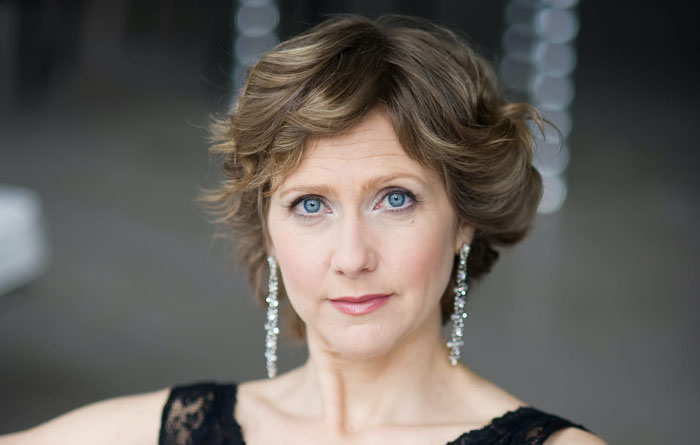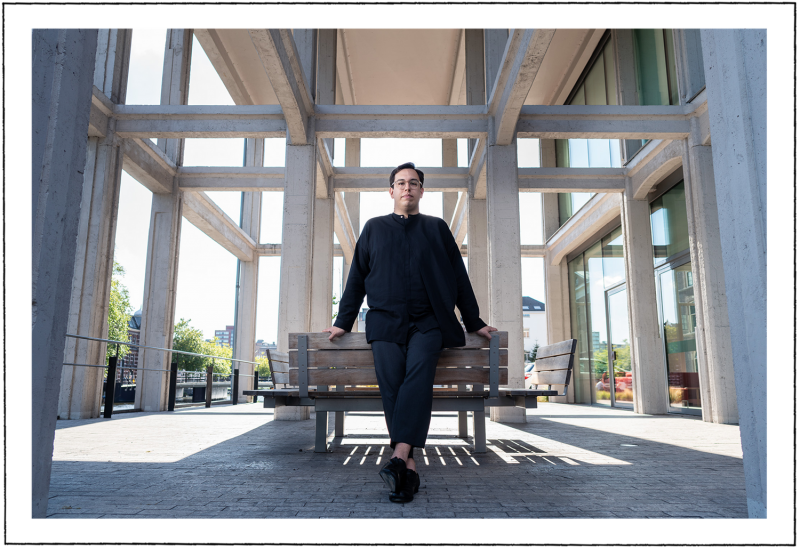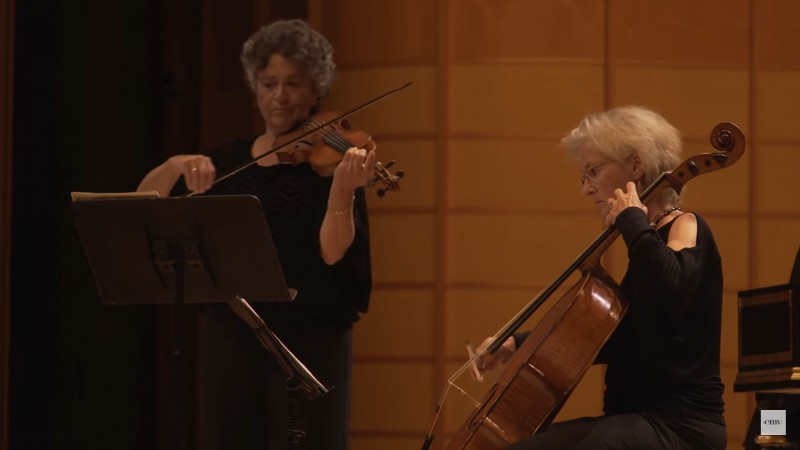Suzie LeBlanc. Photo credit: Tara McMullen.
Suzie LeBlanc’s name is well known to Tafelmusik audiences. Over the years, the beloved soprano has been a frequent guest soloist and has taken part in Tafelmusik recordings, tours, and master classes. In December 2020, we were thrilled to hear that Suzie had been named Artistic and Executive Director of Early Music Vancouver (EMV), an organization that has presented Tafelmusik in concert on many occasions.
A charismatic champion of early music and Acadian culture, Suzie LeBlanc managed an international career for 35 years. Prior to her appointment at EMV, she served as Director of Cappella Antica at McGill University and was the Founder and Artistic Director of Le Nouvel Opéra.
We invited Suzie to contribute a guest post for our blog and she responded with a passionate and intensely personal reflection on her mission: building bridges between people and communities, guiding artists in reaching their potential, and most importantly, helping to make change in the world.
Treasuring the past, welcoming the future
by Suzie LeBlanc, C.M.
These are challenging times.
Our world is facing ecological, economic, and spiritual crises, racial and historical injustice, and a global pandemic. All of these bring to the fore urgent and necessary questions. What kind of world do we want to inhabit? For what causes are we prepared to speak up? How do we manifest our creativity to help solve some of these issues? What responsibilities do we have individually and collectively? What actions can we take on our own and together?
These are some of the questions that keep me awake at night. Other questions include, how can I start a small ripple of interconnectedness and love in my daily work? How can I enhance my personal connection with the natural world? How can I share that with the world? How can we support all the silenced voices? Our lives are built on centuries of silenced voices: those of children, women, Indigenous nations, people of colour, queer people, oppressed nations, animals and plants, Earth, and nature itself.
Taking on the leadership of Early Music Vancouver (EMV) felt almost like a calling, just like I felt called to become a singer earlier in my life. During the application process, it became clear to me that this position was the next step in a direction I had been taking without even realising it. It brings together my passion for medieval, renaissance and baroque repertoire, the ability to present emerging and seasoned artists who are leading the way in the evolution of historical performance practice, and to present artforms from different parts of the world. It provides me with opportunities to open doors and address challenges. I love to build bridges between people, to help artists reach their fullest potential, and to use our platforms to help make change in the world.
Working in early music means working with the past. It often means uncovering forgotten works of art, fragments of creativity, of life. As I study works of the past, I try to decipher and understand their meaning, their purpose, their message. I want to share their beauty and their strength.
By trying to understand the past, I hope to see how lives and stories have shaped my own life and story. Sadly, the stories I read for years in history books told only a small part of the world’s stories. Now we are finally gaining access to some of the missing stories through the teachings and activism of women, Black, Indigenous, and peoples of colour, who are opening our minds to the reparative work that needs to be done. Lending an attentive ear to those conversations and amplifying these voices is an essential part of taking informed action as a leader.
As the Artistic and Executive Director of EMV, I enjoy the nuanced work of honouring tradition while opening my mind and ears to new creation, new music, and to music of all traditions. This summer, EMV is welcoming Two-Spirit, nêhiyaw michif (Cree-Métis) baritone and performance artist Jonathon Adams as EMV’S first Summer Artist-in-Residence. Jonathon is representative of the new generation of classical performers. Gifted with an effortlessly rich, enveloping, and lyrical baritone voice, Jonathon fuses their vocal talents with their lived experiences as a non-binary Indigenous person. Jonathon advocates for inclusivity within early music and consistently proves that there is room to be both dedicated to historically informed performance practice while remaining authentic to who they are and what they believe.
Jonathon Adams
My family is Acadian and I grew up in New Brunswick enjoying traditional songs and dances as well as classical music, well before I discovered early music. Being Acadian means my identity is cultural rather than geographic. Like many displaced peoples, Acadians have no country to call home. Perhaps that is why I am sensitive to the narratives of different cultures, many of which now have roots in Canada. I am always curious about their music since the very fabric of life is contained in songs.
My process as an artist has been to follow my heart, to take on or create projects that move me. I need to feel deeply connected to the repertoire to sing it. Some of my beloved composers and repertoire include Monteverdi and his lesser-known contemporaries, the music written for the Ladies of Ferrara in the late 16th century, and French 17th century airs and motets (Lambert, Delalande and Charpentier).
As a young musician, I loved going to libraries to pore over dusty books looking for lesser-known composers. Later in life I discovered the music of Cozzolani, Cesis, and Aleotti — nuns from Italian convents. In recent years, I’ve enjoyed singing more contemporary music and working with celebrated Canadian composers like John Plant, Christos Hatzis, Emily Doolittle, Alasdair MacLean, Peter Togni, Robert Aitken, Dinuk Wijeratne, and more recently, with Jérôme Blais on a multidisciplinary piece called mouvance. Regardless of the project, communication and collaboration are the pinnacles of my artistic life.
When I first started out as a singer in the 1980s, early music was still quite new in Canada and almost everyone with a serious interest in historical performance left the country to study in Europe. Forty years later, Canada has an ever-expanding community specialized in early European music, thanks to the many who studied in Europe and returned to teach the next generation or to establish ensembles such as Pacific Baroque Orchestra, Studio de Musique Ancienne de Montreal, Arion, and Tafelmusik; Thanks also to the research carried out by renowned Canadian musicologists, the development of instrument making in Canada, and summer courses and workshops like Tafelmusik Baroque Summer Institute (TBSI).
I cannot speak about TBSI without honouring the late Jeanne Lamon, Music Director Emerita of Tafelmusik. What a force of nature! One rarely meets someone with such radiance and a smile that could light up the whole world. Her passion was contagious in the most immediate and powerful ways. I had the pleasure of singing many concerts with Jeanne and Tafelmusik and those memories are full of joy and meaningful moments. After leaving Tafelmusik in 2014, Jeanne worked her magic as Artistic Director of Concerts in Care for Ontario’s Health Arts Society and in Victoria, where she had recently moved. We have lost a great leader who championed early music in Canada and made it vibrant, current, and fashionable.
Jeanne Lamon, left, and Christina Mahler, right, performing with EMV for their program Vivaldi & Bach: The Trio Sonata in the 18th Century
Early Music Vancouver will be dedicating a concert to the memory of Jeanne Lamon during its Vancouver Bach Festival this summer. Chaconne will be recorded at the Chan Centre on July 29 and released on EMV’s Digital Concert Hall in the fall. Violinists Chloe Kim — a close friend of Jeanne’s — and Christi Meyers will be joined by Christina Hutten on harpsichord and by Christina Mahler — Jeanne’s partner — on cello.
I have watched Canada’s early music grow and adapt its mission to our changing world. Music from the past certainly doesn’t mean static music and I am thrilled to witness more and more ensembles dedicate programmes to music by women (Infusion Baroque, Ensemble Scholastica and Le Nouvel Opéra to name a few) and Festivals like Montreal Baroque bringing more inclusivity and diversity to their programming year after year. Montreal’s Festival des Musiciens du Monde is also presenting historical music from all corners of the world.
There are too many Canadian early music ensembles making exciting and creative discoveries and presenting music from different traditions these days to name them all. We are on the verge of seeing an explosion of concerts that build bridges between nations and their histories, and I’m excited to be a part of that. I’m also delighted to be working with Elisa Citterio, Joel Ivany, Jonathon Adams, and Alexander Weimann on an upcoming collaboration between Tafelmusik, Against The Grain, and EMV: stay tuned for more about that project!
During my time as a vocal coach and director of Capella Antica at McGill University, I also had the pleasure of witnessing emerging talent on a weekly basis. I’m thankful for those years of teaching and to my students who also taught me so much.
My innate curiosity has sometimes led me to feeling I had spread myself too thinly. But my love of learning and of the repertoire has always served to prepare me for the next great adventure. After 35 years of touring, developing projects, premiering old and new works and forming a network of artists, I am now happy to focus on building the big project that is Early Music Vancouver. I’m aware of the responsibility and the leadership expected of me and feel lucky to work with an exceptional staff, board members, musicians, volunteers and our many supporters. I look forward to the boundless opportunities for us to be good partners with our early music community and also with those who work for change in our society.
Further listening:
The City of Ladies Festival online concerts
July 27 to August 6, 2021
A collaboration between Early Music Vancouver and Le Nouvel Opéra, these concerts conceived by Suzie LeBlanc looks at the impact and the role of women throughout history via a musical lens.
The Festival includes concerts recorded in Montreal and Belgium.
earlymusic.bc.ca/tickets/digital-concert-hall/
Chaconne
This concert takes place in Vancouver on July 29, broadcast date TBC
Concert dedicated to the memory of Jeanne Lamon
earlymusic.bc.ca/tickets/digital-concert-hall/



